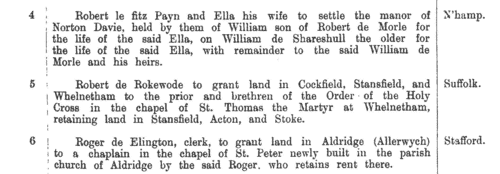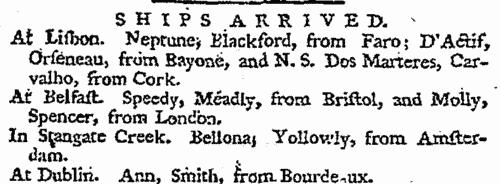Jakyn Surname Ancestry ResultsOur indexes 1000-1999 include entries for the spelling 'jakyn'. In the period you have requested, we have the following 4 records (displaying 1 to 4): Buy all | | | Get all 4 records to view, to save and print for £22.00 |
These sample scans are from the original record. You will get scans of the full pages or articles where the surname you searched for has been found. Your web browser may prevent the sample windows from opening; in this case please change your browser settings to allow pop-up windows from this site. Close Rolls
(1302-1307)
The close rolls of the 31st to 35th years of the reign of king Edward I, that is to the day of his death (7 July 1307), record the main artery of government administration in England, the orders sent out day by day to individual officers, especially sheriffs of shires: they are an exceptionally rich source for so early a period. In amongst this official material, the rolls were also used as a way of recording many acknowledgments of private debts and contracts between individuals. Most of the contents relate to England, but there are also entries concerning Wales, Scotland, Ireland and the English possessions in France.JAKYN. Cost: £4.00.  | Sample scan, click to enlarge

| London, Essex and Hertfordshire clerks, clerics, monks and clergy
(1361-1374)
Ordinations to first tonsure, acolytes, subdeacons, deacons and priests, from the register of bishop Simon de Sudbury of London. London diocese covered Middlesex, Essex and part of Hertfordshire; the ordinations also attracted many persons from distant dioceses bearing letters dimissory from their ordinaries, and these are duly noted in the text. Many of these clerks would not go on to obtain benefices and remain celibate. The lists of subdeacons, deacons and priests state the clerks' respective titles, i. e., give the names of the person or religious house undertaking to support them. Monks and friars ('religious') are listed separately, and the lists of subdeacons, deacons and priests are also separated into beneficed and not beneficed (or 'not promoted'). The acolyte lists are unusual in giving a parish or diocese of origin.JAKYN. Cost: £6.00.  | Sample scan, click to enlarge

| Landowners and tenants in Kent
(1345-1485)
Inquisitions ad quod damnum were held by the appropriate sheriff or escheator (or other officer in whose bailiwick the matter in question might lie) to investigate cases in which the royal or public interest might be damaged by proposed alienation or settlement of land (especially alienation to religious uses, into mortmain). The key findings from these inquisitions were as to the tenure of the land and the service due from it; its yearly value; the lands remaining to the grantor, and whether they sufficed to discharge all duties and customs due from him; and whether he can still be put upon juries, assizes and recognitions, so that the country be not burdened by his withdrawal from them. Generally speaking, this process had the makings of a system of licensing such alienations, and raising money in proportion to the valuations. Equally, there are many items that deal with subjects such as the closing of public roads, the felling or inclosing of woods, or the proposed grant of liberties or immunities. A calendar of these inquisitions from the 19th year of the reign of king Edward III to the 2nd year of Richard III was prepared by the Public Record Office and published in 1906. We have now indexed this calendar by surname and county. Most of the individuals appearing in the calendar are either pious individuals seeking to make grants to religious bodies for the sake of their souls; or landowners securing the disposition and settling of their real estate. But some other names do appear - tenants, trustees, chaplains and clerks.JAKYN. Cost: £6.00.  | Sample scan, click to enlarge

| Masters of Merchantmen
(1785)
The Daily Universal Register of April 1785 includes a section entitled Ship News. This is compiled from reports from Portsmouth, Deal, Plymouth, Whitby, Cowes, Falmouth, Bristol and Gravesend as to merchant shipping movements; news of losses and sightings coming in from various ports; a list of Ships Arrived in the (London) River, in the Clyde, in the Creek(e), in the Downs, off the Lizard, off Scilly, off the Start, in Studland Bay, off Whitby, off the Wight, at Aberdeen, Alicante, Ancona, Antigua, Baltimore, Barbadoes, Barcelona, Bayonne, Belfast, Bombay, Bonny, Bordeaux, Brighthelmstone (Brighton), Bristol, Cadiz, Carlingford, Cartagena, Charlestown, Cork, Cowes, Cuxhaven, Dartmouth, Dominica, Dover, Dublin, Dunkirk, Falmouth, Galway, Gibraltar, Grenada, Guernsey, Halifax (Nova Scotia), Hamburg, Havre de Grace, Hull, Jersey, Kinsale, Lancaster, Leghorn, Limerick, Lisbon, Liverpool, Londonderry, Lochryan, Malaga, Marseilles, Montserrat, Nantes, New Providence (Bahamas), New York, Newry, Oporto, Ostend, Penzance, Plymouth, Poole, Portsmouth, Rotterdam, St Eustatia, St John's, St Kitts, St Vincents, Scarborough, Scilly, Seville, Southampton, Stangate Creek, Tenerife, Texel, Tobago, Venice, Waterford, Weymouth, Whitehaven, and in 'Africa', Georgia, Jamaica, Maryland, North Carolina, Philadelphia, South Carolina and Virginia; and Coast Lists made at the Custom House in London. Except in the home ports, the register refers only to British shipping: each ship is usually identified merely by its name, and the master's surname, although masters' christian names are given occasionally. Naval vessels are mentioned rarely, and their captains' names not usually stated. JAKYN. Cost: £6.00.  | Sample scan, click to enlarge

|
Research your ancestry, family history, genealogy and one-name study by direct access to original records and archives indexed by surname.
|






